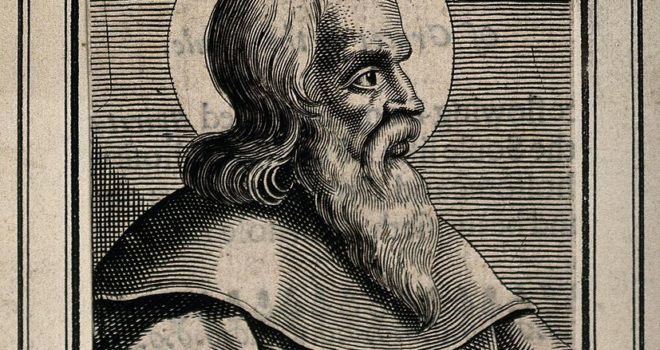St. Polycarp
St. Polycarp was a second century bishop and martyr, and an important leader in the early Church. He became a Christian while very young, and was a disciple of St. John the Apostle and a friend of St. Ignatius of Antioch. St. John appointed Polycarp as bishop of Smyrna (in modern-day Turkey), and St. Ignatius […]



St. Polycarp was a second century bishop and martyr, and an important leader in the early Church. He became a Christian while very young, and was a disciple of St. John the Apostle and a friend of St. Ignatius of Antioch. St. John appointed Polycarp as bishop of Smyrna (in modern-day Turkey), and St. Ignatius visited him there while on his way to Rome (where he was to be martyred). As a leader of the eastern Church, Polycarp himself traveled to Rome to discuss with Pope Anicetus the proper date of Easter; it was agreed that East and West would continue their customs of celebrating Easter on different dates.
Polycarp wrote several epistles; only his Letter to the Philippians still exists. The Acts of Polycarp was written by Christians in Smyrna soon after his death about the year 156, and — with the exception of the account of St. Stephen’s death in the Acts of the Apostles — is the oldest existing factual account of an early Christian’s martyrdom.
According to the story, Polycarp was betrayed by a servant, arrested, and led before the proconsul and a crowd that had gathered in the stadium. Upon being ordered to curse Christ, the bishop responded, “I have served Him for eighty-six years and He has done me no wrong. How can I blaspheme my King and Savior?” The proconsul, at the urging of the crowd, thereupon ordered him burnt at the stake. Polycarp praised God amid the flames, which miraculously failed to touch him, so instead, at the proconsul’s orders, he was killed by a spear thrust (and according to legend, so much of his blood flowed that the flames were extinguished).
Lessons
1. In his Letter to the Philippians, St. Polycarp wrote: “Stand fast, therefore, in this conduct and follow the example of the Lord, ‘firm and unchangeable in faith, lovers of the brotherhood, loving each other, united in truth,’ helping each other with the mildness of the Lord, despising no one.” The holy bishop himself followed his advice to be both gentle and strong.
2. Like Polycarp, we are called to remain true to Christ, for He has always been true to us.
From Johnnette Benkovic’s Graceful Living: Meditations to Help You Grow Closer to God Day by Day

“Leave me as I am. The one who gives me strength to endure the fire will also give me strength to stay quite still on the pyre, even without the precaution of your nails.”
—St. Polycarp at his martyrdom
Johnnette’s Meditation
How is God giving me the strength of endurance today?
Other Saints We Remember Today
- St. Timothy (97), Bishop, Martyr, Patron Against Stomach Disorders, & St. Titus (96), Bishops
- St. Paula (404), Widow, assistant of St. Jerome
image: See page for author, CC BY 4.0, via Wikimedia Commons














